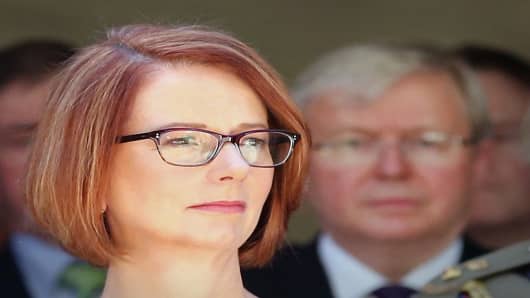Australia's economy is hitting a brick wall after 21 straight years of uninterrupted growth, and this will be made apparent on Tuesday when Canberra unveils its annual budget, which will likely show a big deficit and could risk the country losing its coveted triple-A rating, said experts.
Tuesday's budget, widely expected to be Treasurer Wayne Swan's last, has become one of the country's most eagerly awaited in Australia's recent history.
(Read More:
Reserve Bank of Australia Cuts Rates to Record Low
)
"Australia has had a great run, our economy has been almost bullet proof and our budget has done well really off the back of China... But China has slowed, [commodity] prices have come down and our budget has been revealed as in trouble," said Chris Richardson, director of Deloitte Access Economics, who is based in Sydney.
(Read More: Aussie Dollar at $1.30: Are You Kidding? )
After enjoying two-decades of growth, Australia has more recently been faced with a number of headwinds igniting concerns over future expansion. These include a strong domestic currency, slowing growth in its major trading partner China and weakness in mining, a sector which was behind much of Australia's economic strength in recent times.
"There have been a few years that Australia could rest on its laurels...we should have been moving back to a surplus," said Rob Henderson, chief economist of markets at National Australia Bank.
(Read More:
Can Australia's Economy Survive the Mining Scare?
)
Late last year policymakers backtracked on promises to return the Australian economy to a surplus of A$1.1 billion (US$1.09 billion) by June 2013. This goal now looks even further away as the government recently admitted it has collected billions less in tax revenues than it had hoped for.
A Reuters poll of 13 market economists predicted Swan will unveil a deficit of around A$17 billion for this financial year ending on June 30 and A$10 billion for 2013-14.
A big deficit figure could deepen concerns about Australia's credit rating following credit ratings agency Standard & Poor's warning last month that the country's coveted AAA rating is under threat if national debt keeps rising.




